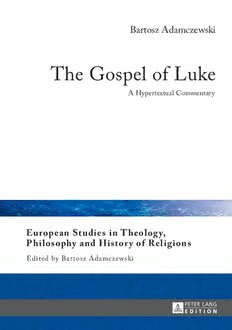
The Gospel of Luke: A Hypertextual Commentary PDF
258 Pages·2016·6.16 MB·English
Most books are stored in the elastic cloud where traffic is expensive. For this reason, we have a limit on daily download.
Preview The Gospel of Luke: A Hypertextual Commentary
Description:
This commentary demonstrates that the Gospel of Luke is a result of twofold, strictly sequential, hypertextual reworking of Paul’s Letter to the Galatians. The ideas of this letter were sequentially illustrated by Luke with the use of numerous literary motifs, taken from other Pauline and post-Pauline letters, the letters of James, Peter, and Jude, the Gospel of Mark, well-known classical Greek and Hellenistic works, the Septuagint, the Damascus Document, and the works of Flavius Josephus. Consequently, the Lucan Jesus narratively embodies the features of God’s Son who was revealed in the person, teaching, and course of life of Paul the Apostle. The Gospel of Luke should therefore be regarded as a strictly theological-ethopoeic work, rather than a biographic one.
See more
The list of books you might like
Most books are stored in the elastic cloud where traffic is expensive. For this reason, we have a limit on daily download.
